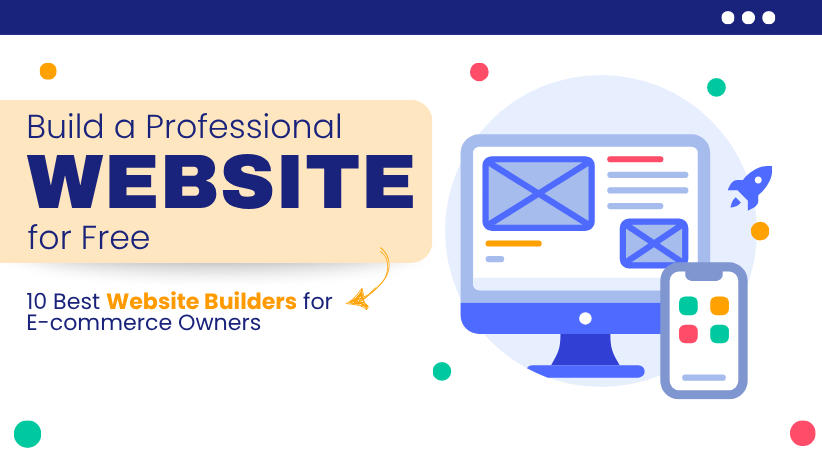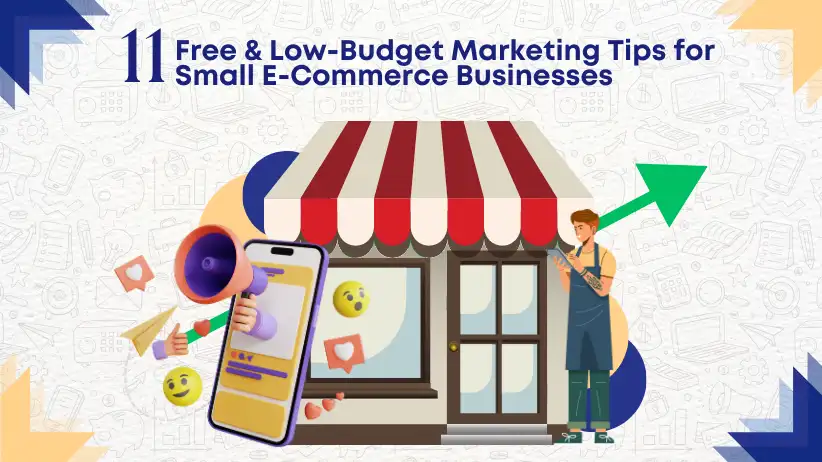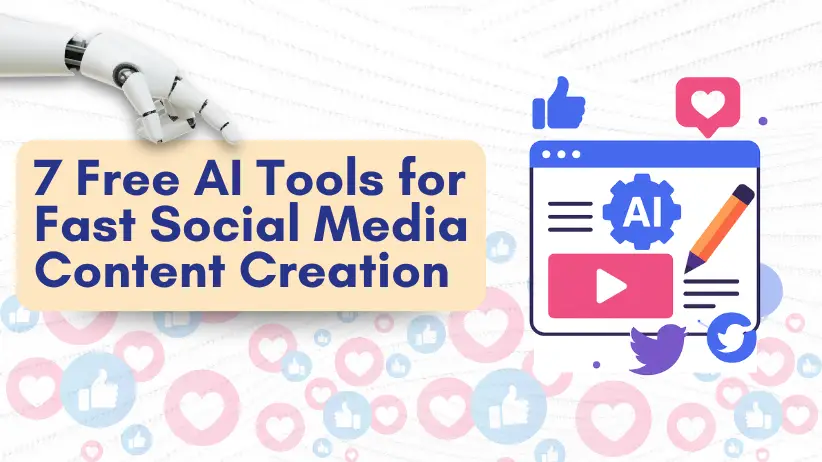Are you starting an e-commerce business but worried about website costs? You’re not alone! According to recent studies, 64% of small businesses build their websites using DIY platforms, and for good reason. Today’s free website builders offer impressive features that used to cost thousands.
In this guide, I’ll walk you through everything you need to know about creating your first e-commerce website—no coding required. By the end, you’ll have a clear path to establishing your online presence without breaking the bank.
What “Free” Really Means: While these website builders offer free plans, it’s important to understand their limitations for e-commerce. Most free plans allow you to build a site and showcase products, but complete selling functionality often requires upgrading to paid plans. We’ll clearly outline what you can and cannot do with each free option.
Table of Contents
- Why Free Website Builders Are Perfect for New E-commerce Businesses
- What to Look for in a Free Website Builder
- When to Choose a Free Website Builder vs. a CMS Platform
- Part 1: Top 5 Free Website Builders for Beginners
- Comparing the Top Free Website Builders
- Part 2: Top 5 CMS Options for Scalable E-commerce
- Final Thoughts: Taking the First Step
Why Free Website Builders Are Perfect for New E-commerce Businesses
When you’re just starting your e-commerce journey, every dollar counts. Free website builders offer several key advantages that make them ideal for US-based entrepreneurs:
- Zero upfront investment: Test your business concept without financial pressure
- User-friendly interfaces: Drag-and-drop tools make design accessible to everyone
- Professional templates: Look established from day one with modern designs
- Free hosting included: No separate hosting fees to worry about
- Mobile-responsive designs: Capture the 79% of smartphone users who shop online (websites that automatically adjust to look good on phones)
- Basic marketing tools: Start promoting your business immediately
Success Story: Tony, a Florida-based handmade soap seller, shared: “I was terrified of building a website, but using Wix’s free plan let me create something professional in a weekend. Six months later, I was making enough sales to upgrade to a paid plan.”
What to Look for in a Free Website Builder
Not all free website builders are created equal, especially for e-commerce. Here are the key features to prioritize:
- E-commerce functionality: Can you actually sell products through the free plan?
- Ease of use: How intuitive is the editor for complete beginners?
- Mobile responsiveness: Will your site look good on phones (where 65% of e-commerce traffic comes from)?
- Design flexibility: Can you customize the look to match your brand?
- SEO features: Will customers be able to find you on Google?
- Upgrade path: What happens when your business outgrows the free plan?
- Security features: Does it include SSL certification for customer trust?
WHAT IS SSL? SSL (Secure Sockets Layer) is a security technology that creates an encrypted connection between your website and your visitor’s browser. Having SSL is essential for e-commerce websites as it protects customer information and builds trust.
When to Choose a Free Website Builder vs. a CMS Platform
Deciding between a free website builder and a more advanced CMS depends on your specific business needs, technical skills, and growth plans. Here’s how to determine which is right for you:
Choose a Free Website Builder If:
- You’re just starting out: Testing a business concept or launching your first online store requires minimal investment.
- You need a quick setup: You want to start selling within days, not weeks.
- You have limited technical skills: You prefer drag-and-drop simplicity over coding or complex settings.
- Budget is tight: You need to minimize costs until your business generates consistent revenue.
- You have a small product catalog: Your store will have fewer than 50 products initially.
- You value simplicity: You’d rather focus on marketing and sales than website management.
Real User Experience: Maria, a first-time entrepreneur selling handmade soaps, explains: “Using Wix’s free plan let me launch in a weekend with zero technical knowledge. I could focus on perfecting my products while still having a professional online presence.”
Choose a CMS Platform If:
- You’re planning significant growth: Your business plan includes scaling to hundreds of products or high traffic volumes.
- You need advanced customization: Your business requires unique features or workflows not available in standard templates.
- You want complete ownership: You prefer having full control over your website’s code, data, and functionality.
- You’re concerned about platform limitations: Free builders often restrict certain features that might become important as you grow.
- You have specific technical requirements: Your business needs specialized integrations with other systems.
- You can invest in development: You have the budget for hosting and possibly technical assistance.
A Practical Approach for Most Beginners
Many successful e-commerce businesses follow this progression:
- Start with a free website builder to validate your business idea and begin generating sales
- Upgrade to a paid plan on the same platform once you have consistent revenue
- Consider migrating to a CMS solution when platform limitations begin hindering growth
This approach minimizes your initial risk while providing a clear upgrade path as your business succeeds. Remember, you can always export your product data and customer list when transitioning between platforms.
Part 1: Top 5 Free Website Builders for Beginners
1. Wix
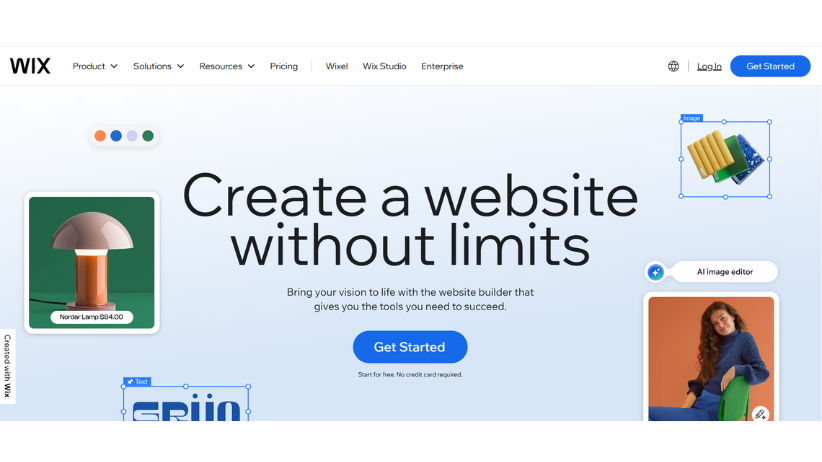
Platform Overview: Wix combines powerful e-commerce capabilities with extreme ease of use, making it ideal for beginners who still want design flexibility. Its drag-and-drop editor gives you precise control over every element of your site.
Free Plan Features:
- Wix-branded domain and hosting (yourbusiness.wixsite.com)
- 500MB storage (approximately 100-200 high-quality product images)
- Mobile-responsive designs that look great on all devices
- Limited e-commerce functionality with Wix branding on checkout
- SEO basics (customize page titles, descriptions, and URLs)
Limitations: Free plan displays Wix ads, limits storage, and charges transaction fees on sales.
Pricing to Upgrade: $16-$59/month for business plans with full e-commerce features.
Learning Curve: Beginner-friendly with minimal technical skills required.
Best for: Visually-oriented businesses like crafts, art, or fashion where design flexibility matters. Wix gives you precise control over the look and feel of your site without requiring any coding knowledge.
Expert Tip: “Wix’s editor offers the most design freedom of any website builder, but this can be overwhelming. Start with a template close to your vision rather than building from scratch.” – Sarah Chen, Web Design Consultant
2. Shopify (14-Day Free Trial)
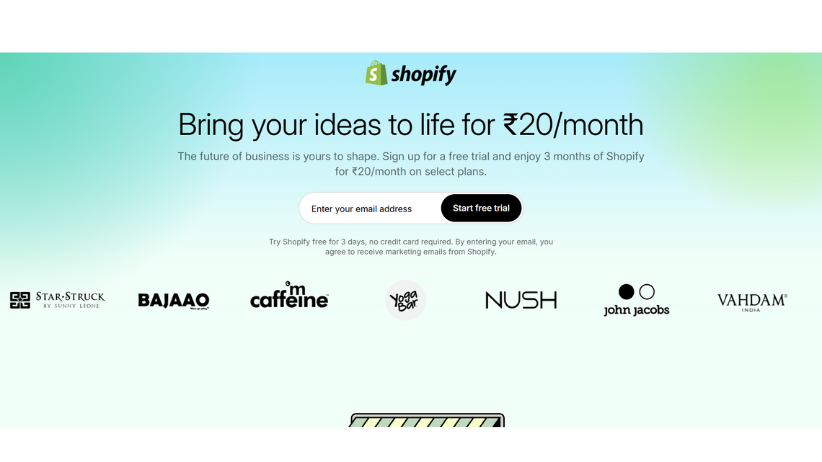
Platform Overview: Shopify is the industry-leading dedicated e-commerce platform, specifically designed for online selling with all the features businesses need to grow.
Free Trial Features:
- Complete online store functionality during trial period
- 70+ professional e-commerce specific themes
- Abandoned cart recovery (automatically email customers who don’t complete checkout)
- Product inventory management system
- Built-in payment processing for all major methods
Limitations: Not permanently free; requires subscription after trial.
Pricing After Trial: $29-$299/month depending on features needed.
Learning Curve: Moderate – specifically designed for e-commerce with intuitive interface.
Best for: Businesses planning to scale quickly who need robust e-commerce tools. If you’re serious about selling online and expect to grow beyond a few products, Shopify’s trial is worth exploring before committing.
Expert Tip: “Use Shopify’s trial to thoroughly test the platform with real products. Their themes are designed specifically to increase conversion rates, unlike general website builders.” – Michael Torres, E-commerce Consultant
3. Square Online (Weebly)
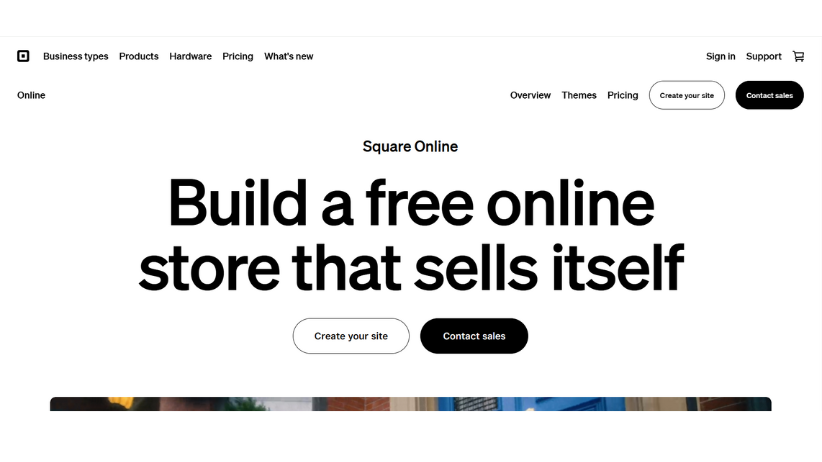
Platform Overview: Square Online combines Weebly’s user-friendly design tools with Square’s powerful payment processing, creating an excellent option for businesses that sell both online and in person.
Free Plan Features:
- Unlimited products on free plan (a major advantage over competitors)
- No transaction fees beyond standard payment processing (2.9% + $0.30 per transaction)
- In-person selling integration with Square POS system
- Automatic inventory tracking across online and offline channels
- Order pickup options for local customers
Limitations: Square branding on site, limited customization options compared to other platforms.
Pricing to Upgrade: $12-$72/month to remove branding and add features.
Learning Curve: Very easy – one of the most straightforward builders available.
Best for: Businesses that sell both online and in physical locations. The free plan is genuinely usable for small businesses, especially if you’re already using Square for payment processing.
Expert Tip: “Square Online’s free plan offers the most generous e-commerce features without requiring payment. If you’re budget-conscious but serious about selling, this should be your first choice.” – Jessica Wong, Small Business Advisor
4. Zyro

Platform Overview: Zyro is a newer platform gaining popularity for its simplicity and AI-powered tools that make website creation faster and easier than traditional builders.
Free Plan Features:
- AI-powered site generation (answer questions to build custom site)
- Clean, modern templates with professional design elements
- Basic e-commerce features on free plan
- Strong mobile optimization with fast-loading templates
- Built-in image editor for product photos
Limitations: 500MB storage, Zyro branding prominent on free sites, limited selling features.
Pricing to Upgrade: $11.99-$14.99/month for full e-commerce functionality.
Learning Curve: Very easy – perfect for absolute beginners.
Best for: Ultra-beginners who want the fastest possible setup time. If you’re intimidated by website building, Zyro’s guided approach removes much of the guesswork.
Expert Tip: “Zyro’s AI tools can generate surprisingly good content and layouts for beginners. Use their AI writer to help with initial product descriptions, then personalize them.” – Thomas Reed, Digital Marketing Specialist
5. WordPress.com
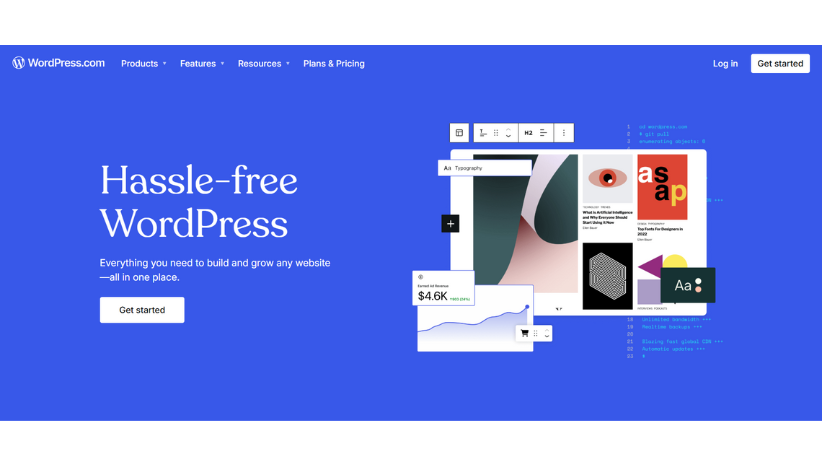
Platform Overview: WordPress.com is the hosted version of the world’s most popular website platform, offering a balance of user-friendliness and powerful capabilities that can grow with your business.
Free Plan Features:
- Blog-friendly platform perfect for content marketing
- Great SEO capabilities that help with organic traffic
- Huge template library with thousands of options
- Community support forums with millions of users
- Extendable with plugins (on paid plans)
Limitations: Limited e-commerce on free plan (showcase only), WordPress.com branding.
Pricing to Upgrade: $4-$45/month depending on features needed.
Learning Curve: Moderate – more complex than drag-and-drop builders but still accessible.
Best for: Content-heavy stores or those planning extensive blogging alongside products. If your sales strategy includes educational content or storytelling, WordPress.com’s blogging capabilities make it a strong choice.
Expert Tip: “WordPress.com’s free plan is best for building an audience first through content, then adding e-commerce later. Focus on creating valuable industry content to attract potential customers.” – Amanda Johnson, Content Strategy Expert
Comparing the Top Free Website Builders
| Platform | Free E-commerce Features | Storage | Design Flexibility | Mobile Responsive | True “Free” Status | Best For |
|---|---|---|---|---|---|---|
| Wix | Limited (showcase with Wix branding) | 500MB | High | Yes | Free with limitations | Design-focused stores |
| Square Online | Unlimited products with actual selling | Unlimited | Medium | Yes | Most generous free e-commerce | Omnichannel sellers |
| Zyro | Basic store features | 500MB | Medium | Yes | Free with significant limitations | Ultra-beginners |
| WordPress.com | Product showcase only | 3GB | High | Yes | Free for content, paid for selling | Content-driven stores |
| Shopify | Full features during trial | Unlimited | High | Yes | Trial only (14 days) | Serious e-commerce businesses |
Part 2: Top 5 CMS Options for Scalable E-commerce
As your business grows, you might need more powerful tools. These Content Management Systems (CMS) require hosting but offer greater scalability and control:
1. WordPress.org with WooCommerce
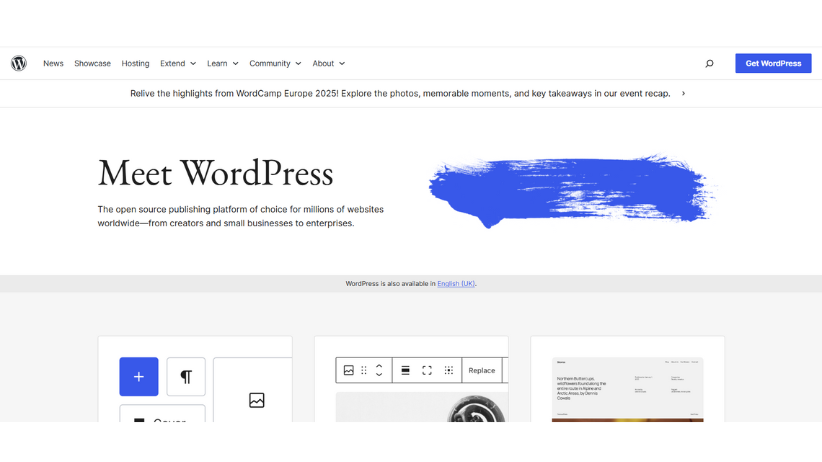
Platform Overview: WordPress.org is the self-hosted version of WordPress that powers over 40% of all websites online, and when combined with the free WooCommerce plugin, creates a powerful and flexible e-commerce system.
Key Features:
- Complete ownership and control of your site
- WooCommerce plugin adds unlimited products, payment gateways, and shipping options
- Thousands of themes and plugins for unlimited customization
- Superior SEO capabilities for organic traffic
- Advanced marketing tools and integrations
Costs: Free software but requires hosting ($3-10/month for beginners)
Learning Curve: Moderate to Advanced – requires more technical knowledge than hosted builders
Best for: Growing businesses that need flexibility and want to avoid platform limitations.
Expert Tip: “Start with a WooCommerce-specific theme rather than adding the plugin to a general WordPress theme. This ensures all e-commerce elements are properly designed from the beginning.” – Robert Chen, WordPress Developer
2. Joomla with VirtueMart
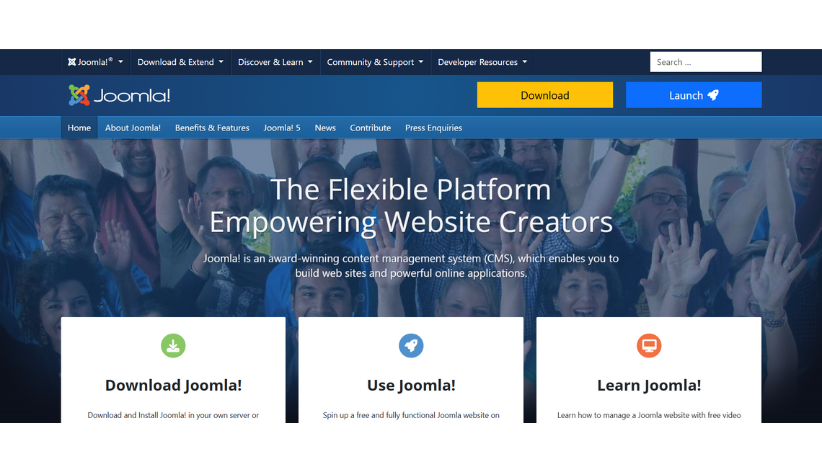
Platform Overview: Joomla is an enterprise-grade CMS with powerful native capabilities for managing complex content structures, and VirtueMart adds comprehensive e-commerce functionality.
Key Features:
- Built-in multilingual support without plugins
- Advanced user management for team permissions
- Flexible content organization for complex catalogs
- Robust security features and regular updates
- VirtueMart extension for complete store functionality
Costs: Free software but requires hosting ($5-15/month)
Learning Curve: Advanced – steeper learning curve than WordPress
Best for: Mid-sized businesses with complex organizational needs or multiple language requirements. Joomla offers more structure than WordPress but requires more technical knowledge.
3. Magento Open Source (Adobe Commerce)
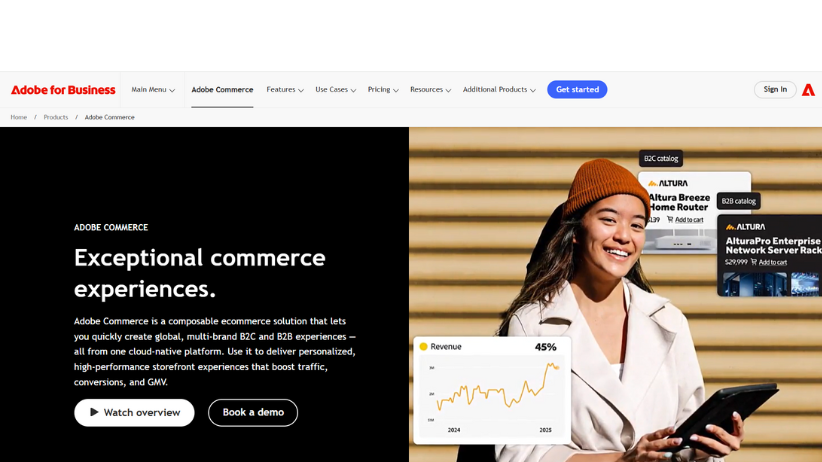
Platform Overview: Magento Open Source is the free version of Adobe’s enterprise e-commerce platform, offering industrial-strength capabilities for serious online merchants.
Key Features:
- Unlimited scalability for large catalogs
- Multi-store functionality from one backend
- Advanced product options and configurations
- B2B features for wholesale businesses
- Sophisticated marketing and promotion tools
Costs: Free software but requires robust hosting ($25+/month)
Learning Curve: Very Advanced – typically requires developer assistance
Best for: Larger businesses with significant inventory or those planning rapid growth. While powerful, Magento typically requires technical expertise to implement properly.
4. PrestaShop
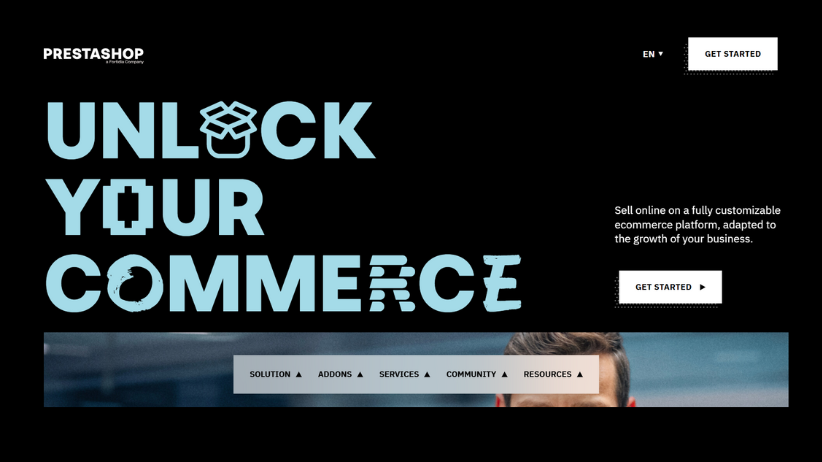
Platform Overview: PrestaShop is an open-source e-commerce platform that balances power and ease of use, particularly popular in Europe and gaining traction in the US market.
Key Features:
- Lightweight and fast performance
- International commerce features built-in
- User-friendly admin interface
- 800+ built-in e-commerce features
- Active community and marketplace
Costs: Free software but requires hosting ($5-20/month)
Learning Curve: Moderate – easier than Magento but still requires some technical knowledge
Best for: Small to medium businesses looking for a dedicated e-commerce platform that balances power and ease of use without the complexity of Magento.
5. OpenCart
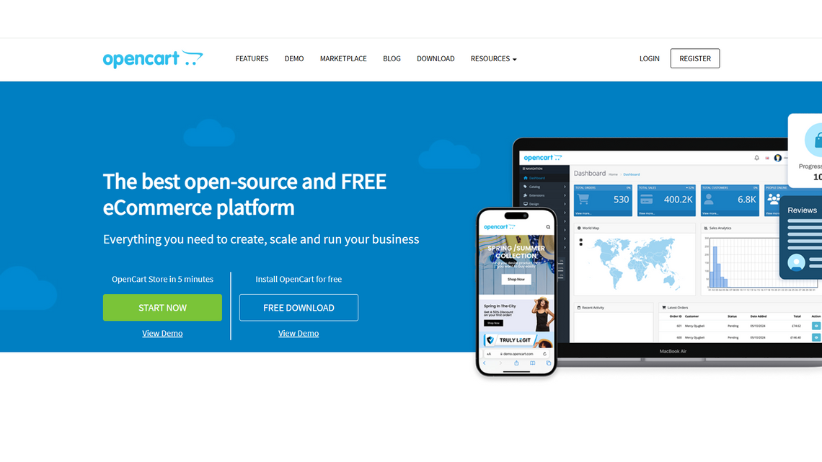
Platform Overview: OpenCart is a straightforward open-source e-commerce platform focused on simplicity while still offering comprehensive store management capabilities.
Key Features:
- Simple installation and setup process
- Multistore functionality for multiple brands
- Strong focus on international selling
- Extensive extension marketplace
- Low server requirements
Costs: Free software but requires hosting ($3-15/month)
Learning Curve: Moderate – one of the easier self-hosted platforms
Best for: Budget-conscious merchants who need more power than free website builders but find Magento too complex. OpenCart offers a middle ground with good international selling features.
Final Thoughts: Taking the First Step
Creating your first e-commerce website doesn’t need to be expensive or complicated. Free website builders offer everything you need to test your business concept, start making sales, and build customer relationships.
Remember, 94% of first impressions relate to your site’s design—but that doesn’t mean it needs to be complex. A clean, mobile-friendly site that clearly showcases your products is all you need to start.
The most important step is simply to begin. Choose one of the platforms above, set aside a weekend to build your site, and take that first step toward e-commerce success. Your future customers are waiting!
Need personalised guidance for your specific e-commerce niche? Our team at Creoquad specialises in helping US-based small businesses establish and grow their online presence. Contact us for a free consultation.
